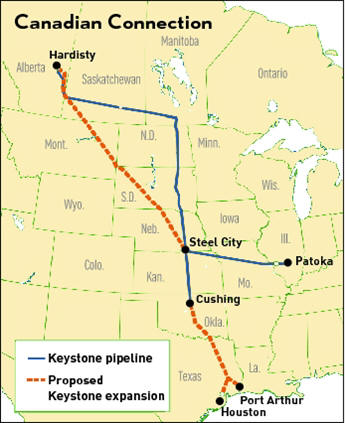An Oil Market Of Our Very Own
Energy Policy: Gasoline prices are punitively high, and many blame the administration. But prices could be lower and approval ratings higher if the president got behind an important pipeline project.
The Keystone XL pipeline, proposed six years ago, is a 36-inch feed linking Alberta's oil sands fields to the refineries of Texas' Gulf Coast. It would carry not only Canadian crude, also but oil from the energy-rich U.S. states.
If allowed to proceed, it would eventually transport more than a million barrels of crude each day — more, according to Heritage Foundation analyst David Kreutzer, than we now import from either Saudi Arabia or Venezuela, our two largest suppliers after Canada and Mexico.
"Along with the pipeline and petroleum," says Kreutzer, "would come increased energy security and a boost to the U.S. economy."
Given the benefits, who could oppose such a project? Washington Democrats. They reflexively oppose any proposal that increases energy availability. The green energy solutions they promote aren't designed to expand energy; they are meant to restrain capitalism.
So when a Democrat — in this case, the Democrat in chief — indicates that maybe some reasonable thinking is outweighing nonsensical green ideology, there's reason for tempered optimism.
We don't want to overstate the possibility. But when President Obama pointed out last week that Canada, unlike more volatile suppliers, is a "steady and stable and reliable" source of crude, it suggested he could be more open to the pipeline than those who have accused him of delaying the project think. His support is key; the trans-border pipeline needs State Department approval.
Environmentalists, of course, oppose the project. They imagine spills because they believe the pipe's steel won't be strong enough to hold the load. They are not moved by fact it will be made of advanced materials and transport the crude at low pressure.
The environmental lobby will cite, as well, the higher level of emissions associated with oil sands production. But as we've noted many times, there's nothing to fear about CO2. It is a naturally occurring substance necessary for life. It has a weak greenhouse effect and makes up only a small sliver of our atmosphere.
Expect environmentalists to also argue there's not enough oil in the ground to justify such a project. They'd be wrong. The Green River formation in the Western U.S. alone might hold more than 1.5 trillion barrels of oil, the U.S. Geological Survey estimates.
We like to think the Keystone XL Pipeline, part of which is already built, could be the start of a North American oil market that would operate independently of a world market viciously skewed due to governments owning and controlling at least 80% the world's crude.
Such a market would not be subject to the depredation of OPEC and other states that use oil as a weapon against the U.S. Without their interference, prices would the set by supply and demand — and probably be lower.
Obama should let Keystone be the cornerstone of such a market by ordering his State Department to approve the project. That in itself could have an impact at the pump. The market response to a future with more oil is lower prices. Relief is just an executive decision away.


